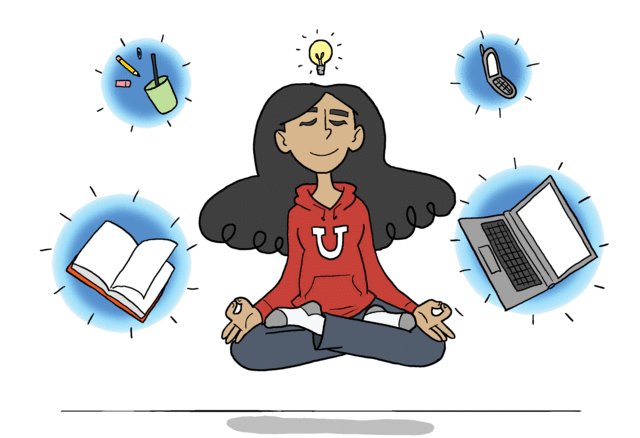Trees are blooming. I heard more than one bird outside the Marriott Library the other day. People go out in shorts and T-shirts more and more often. Spring Break has come and gone. About this time every year, classes kick it into high gear, professors begin preparing students for finals and students themselves manage to have one eye on the calendar while keeping the other fixed either resolutely on their classes or despairingly on their class work. Is there a solution to this sort of distracted, flat-out exhausted living? What might be the value of living in the here-and-now of homework, lectures and intensive studying? Only by living consciously — and not for the future — can we effectively cope with our seemingly interminable stressors and ultimately live a life not perpetually longing for a better tomorrow.
Picture this: You’re studying somewhere quiet, a stack of books by your side. You’re poring over an assignment due tomorrow morning. It’s getting late. Your back hurts at this slouched angle, but you refuse to sit up because the temptation to focus on anything other than the task at hand is too great. You’ve hidden your phone somewhere far away from you.
It might be too natural in a situation like this to imagine the feeling you’ll have once finals are over and you’re allowed at least a few weeks of break from exams and homework. To picture a time when no professor can expect anything from you for at least a couple heavenly days.
Fight this urge to pine for the future. Not just in these moments of frantic panic-driven studying, but always.
At this point it might be nothing but a banal platitude (even saying that risks it becoming so), but living for the future is the simplest way to miss out on actually living. Though I agree that being in a state of anxiety is unpleasant, especially a situation as stress-inducing as final exam season, great learning — beyond anything taught in class, online, or in day-to-day interactions — can be done when one notices how the body and mind cope with the experience of handling that stress and anxiety.
Alan Watts, a prominent writer and philosopher of the mid-20th century, thought much on existence and experience, and predicted, to an eerily prescient degree, the general state of anxiety a tech-driven world would inevitably find itself in. One out of his many acclaimed books, titled The Wisdom of Insecurity: A Message for an Age of Anxiety, discusses what it means to truly live in the moment and why doing so makes more sense than not.
“Since what we know of the future is made up of purely abstract and logical elements — inferences, guesses, deductions — it cannot be eaten, felt, smelled, seen, heard, or otherwise enjoyed,” he writes. “To pursue it is to pursue a constantly retreating phantom, and the faster you chase it, the faster it runs ahead.”
This is to say, if we are occasionally pining for the future, if we wish not to live in the moment and instead live in some other one further along the line, we are aiming for a target that cannot be hit. We are performing an essentially futile maneuver in order to trick ourselves out of experiencing pain or boredom or frustration. On how many occasions have you imagined the pleasure you might feel at some future time, only to reach that moment and feel a little uncomfortable with how uninspiring that moment actually is?
These are simple questions asked to illustrate what I think is a pretty important point: You shouldn’t let any moment of your life go by unexperienced. If you wait for only the good times to really feel, you run the risk of those times being perpetually artificial and unsatisfying.
Be conscious in your experience of pain, discomfort and anxiety. When you’re studying for finals, when you can’t seem to get comfortable in that chair or when your mind strains to simply comprehend what it is you’re reading, appreciate first of all the struggle. The rest — the future, your comfort, joy and happiness — will come.
As Watts wrote, “If we are to continue to live for the future, and to make the chief work of the mind prediction and calculation, [we] must eventually become a parasitic appendage to a mass of clockwork.” We lose some of the subtlest graces of simple humanity living this way. Or, to recycle an old phrase — if we can’t handle life at its worst, perhaps we don’t deserve it at its best.


